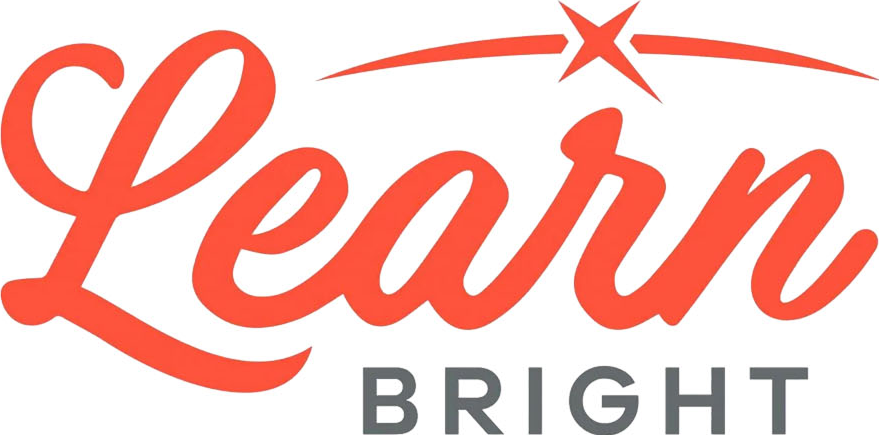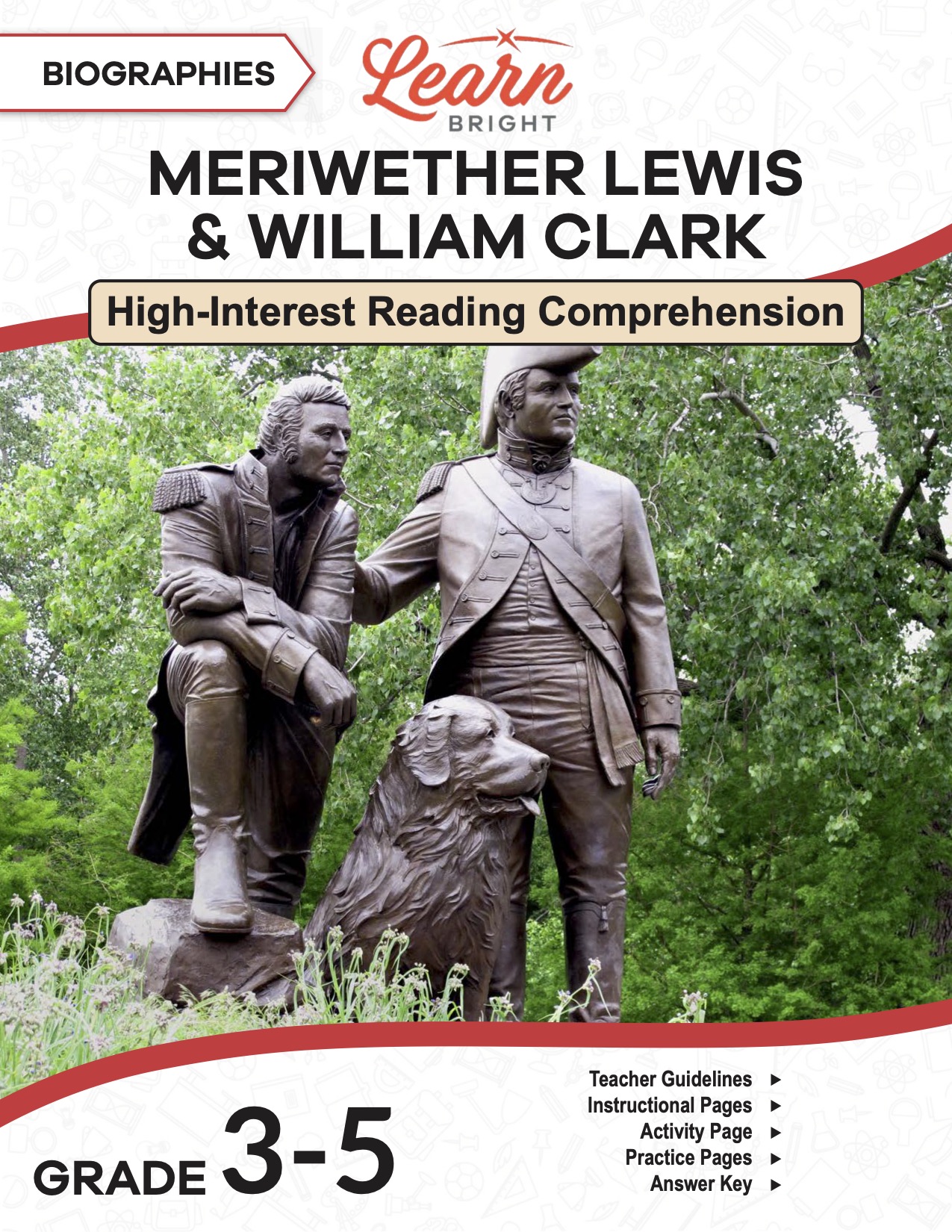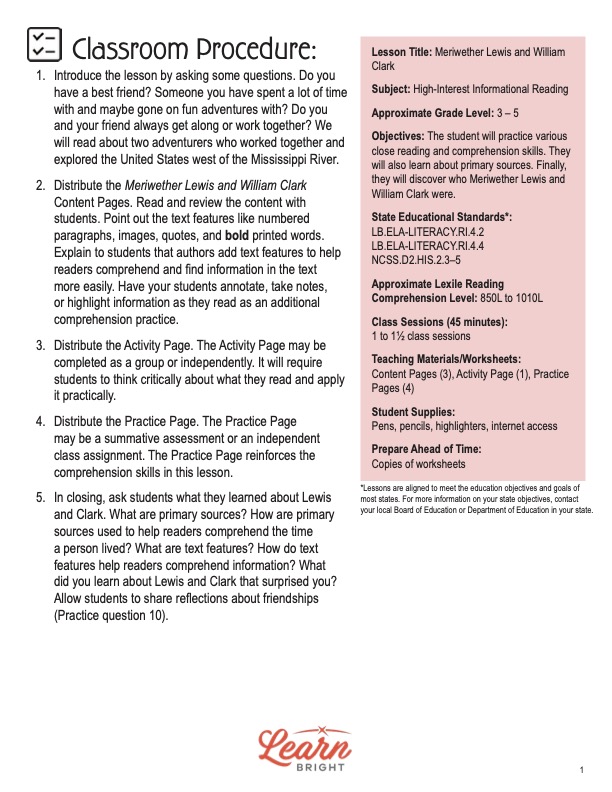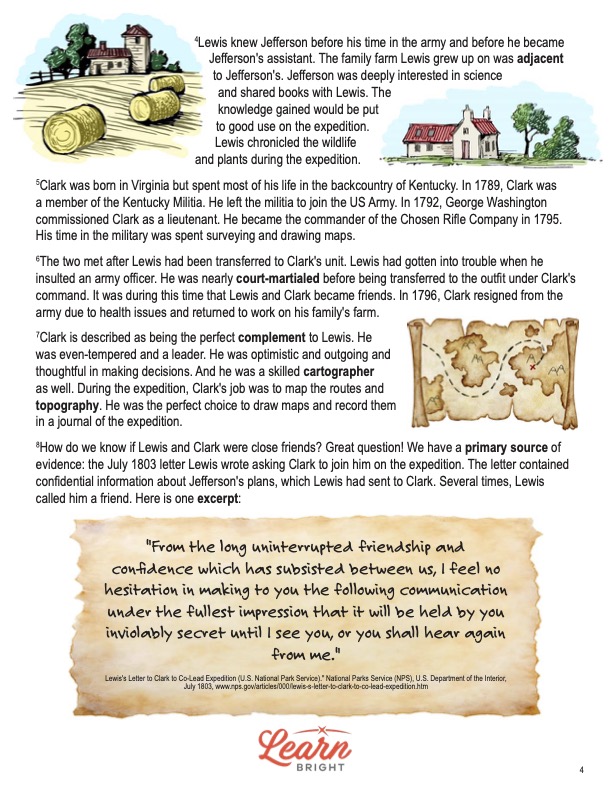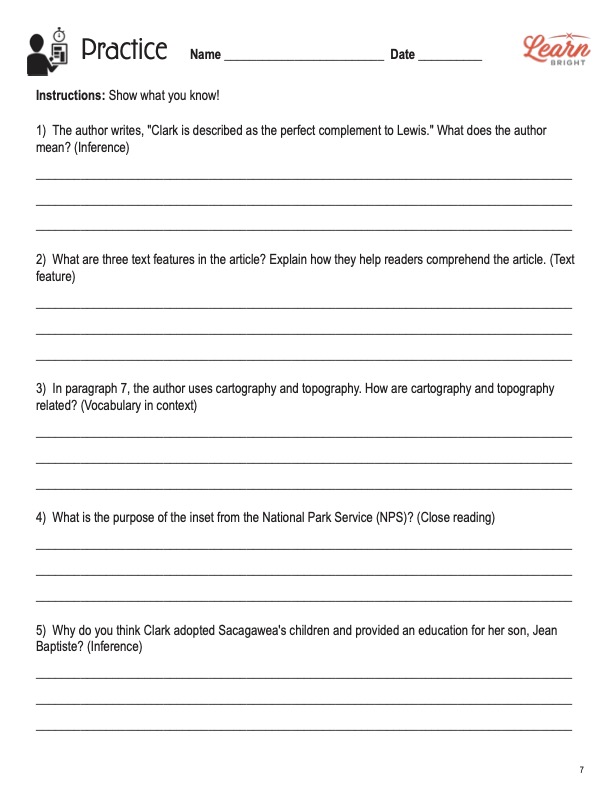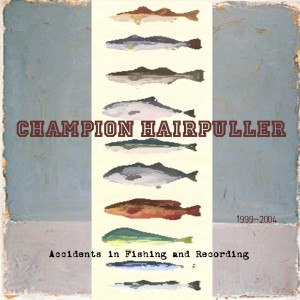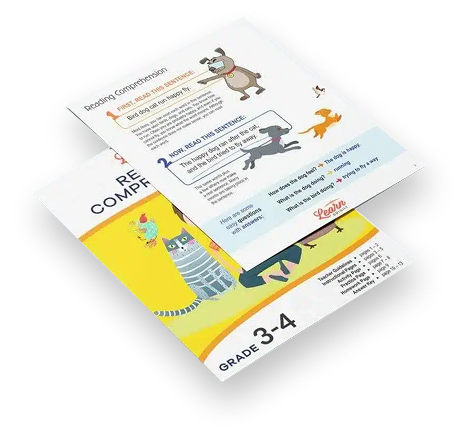Description
What our Meriwether Lewis and William Clark lesson plan includes
Lesson Objectives and Overview: Meriwether Lewis and William Clark is a high-interest reading comprehension lesson plan. As such, the student will practice various close reading and comprehension skills and learn about primary sources. They will also discover who Meriwether Lewis and William Clark were. This lesson is for students in 3rd grade, 4th grade, and 5th grade.
Classroom Procedure
Every lesson plan provides you with a classroom procedure page that outlines a step-by-step guide to follow. You do not have to follow the guide exactly. The guide helps you organize the lesson and details when to hand out worksheets. It also lists information in the yellow box that you might find useful. You will find the lesson objectives, state standards, and number of class sessions the lesson should take to complete in this area. In addition, it describes the supplies you will need as well as what and how you need to prepare beforehand. For this lesson, make sure your students have internet access.
Teacher Notes
The paragraph on this page provides a little more information or guidance on what to expect from the lesson. It explains that you can teach this lesson in a whole-class setting or as an independent, small-group activity. You can use the blank lines to record any thoughts or ideas you have as you prepare.
MERIWETHER LEWIS AND WILLIAM CLARK LESSON PLAN CONTENT PAGES
The Expedition
The Meriwether Lewis and William Clark lesson plan contains three content pages. It’s hard to imagine, but in 1800, the United States boundary ended at the Mississippi River. Few explorers had gone west of the river. In 1803, President Thomas Jefferson authorized the purchase of the Louisiana Territory from France. The purchase doubled the size of the United States!
Two friends were chosen by Jefferson to explore, map, and report back what the land looked like west. They were Meriwether Lewis and William Clark. Jefferson made them co-commanders of the expedition. Lewis and Clark would travel more than 8,000 miles, leading a group of explorers. The journey would take two years. Many historians consider it the most remarkable expedition in the history of the United States. So, who were Lewis and Clark? Why were they Jefferson’s choice to take on this mission?
Who Were Lewis and Clark?
Lewis was a Virginian. He served as Thomas Jefferson’s personal assistant from 1801 to 1803. Before joining Jefferson in the White House, Lewis was a captain in the US Army, and that is where he first met William Clark. Though he shared a similar background to Clark, their personalities differed. Historians believe that Lewis suffered from depression and melancholy and was often in a state of despair.
Meriwether Lewis knew Jefferson before his time in the army and before he became Jefferson’s assistant. The family farm Lewis grew up on was adjacent to Jefferson’s. Jefferson was deeply interested in science and shared books with Lewis. The knowledge gained would be put to good use on the expedition. Lewis chronicled the wildlife and plants during the expedition.
Clark was born in Virginia but spent most of his life in the backcountry of Kentucky. In 1789, Clark was a member of the Kentucky Militia. He left the militia to join the US Army. In 1792, George Washington commissioned Clark as a lieutenant. He became the commander of the Chosen Rifle Company in 1795. His time in the military was spent surveying and drawing maps.
The two met after Lewis had been transferred to Clark’s unit. Lewis had gotten into trouble when he insulted an army officer. He was nearly court-martialed before being transferred to the outfit under Clark’s command. It was during this time that Lewis and Clark became friends. In 1796, Clark resigned from the army due to health issues and returned to work on his family’s farm.
Friendship of the Adventurers
Clark is described as being the perfect complement to Lewis. He was even-tempered and a leader. He was optimistic and outgoing and thoughtful in making decisions. And he was a skilled cartographer as well. During the expedition, Clark’s job was to map the routes and topography. He was the perfect choice to draw maps and record them in a journal of the expedition.
How do we know if Lewis and Clark were close friends? Great question! We have a primary source of evidence: the July 1803 letter Lewis wrote asking Clark to join him on the expedition. The letter contained confidential information about Jefferson’s plans, which Lewis had sent to Clark. Several times, Lewis called him a friend. The lesson shows an excerpt from a letter Lewis wrote to Clark. In it, he mentions their great friendship.
Lewis also wrote, “If therefore there is anything . . . in this enterprise, which would induce you to participate with me in its fatigues, its dangers and its honors, believe me, there is no man on earth with whom I should feel equal pleasure in sharing them as with yourself.”
Travels Across the States
In May 1804, Lewis and Clark began their arduous trip with a small band of explorers called the Corps of Discovery. A Pennsylvanian carpenter named Patrick Gass accompanied the crew. He kept a journal recording many of the trip’s events. His journal became a helpful source for historians in learning about the expedition.
During the trip, they faced many dangers. Harsh weather, sometimes conflicts with Native American tribes, starvation, and dangerous rapids were a constant threat. With Sacagawea as their guide and translator, they reached the Pacific Ocean in November 1805. The crew decided to remain there during the winter. The winter camp was named Fort Clatsop, and both Clark and Lewis described the fort in their journals as a miserable place. Luckily, by March of 1806, they began the trek back to Washington, DC, to report to President Jefferson.
Life After the Expedition
The return journey was no easier. Lewis and Clark encountered many of the same difficulties. They left Sacagawea at Fort Mandan, then continued the expedition home. In September 1806, they arrived in St. Louis, where the grand adventure had begun. Most newspapers hailed the two men as heroes. However, some of Jefferson’s opponents quickly criticized the expedition as too expensive and a waste of time. Some believed it would expand enslavement westward.
What happened to Lewis and Clark next? Lewis was named the governor of the Louisiana Territory. In 1809, only 5 years after the start of the great expedition, he died mysteriously. Some historians believe he was murdered while others say he died by suicide. Clark became governor of the Missouri Territory. Sacagawea’s husband took both of her children to him after her death. Clark adopted both children and provided an education for her son, Jean Baptiste. In 1838, William Clark passed away.
MERIWETHER LEWIS AND WILLIAM CLARK LESSON PLAN WORKSHEETS
The Meriwether Lewis and William Clark lesson plan includes two worksheets: an activity worksheet and a practice worksheet. Each one will help students solidify their grasp of the material they learned throughout the lesson. You can refer to the classroom procedure guidelines to know when to hand out each worksheet.
PRIMARY SOURCES ACTIVITY WORKSHEET
For the activity, students will practice analyzing primary sources. They will first read through three passages from the journals of Lewis, Clark, and Patrick Gass. After they rewrite the excerpts in their own words, they will explain the main point that the authors are making.
MERIWETHER LEWIS AND WILLIAM CLARK PRACTICE WORKSHEET
The practice worksheet requires students to answer a series of 10 questions. These questions all relate to the content pages, so students will need to refer to them often for the answers. In addition, each question provides which reading tool the question corresponds to, such as text feature, vocabulary, or comprehension.
Worksheet Answer Keys
At the end of the lesson plan document is an answer key for the practice worksheet. The correct answers are all in red to make it easier for you to compare them with students’ responses. If you choose to administer the lesson pages to your students via PDF, you will need to save a new file that omits these pages. Otherwise, you can simply print out the applicable pages and keep these as reference for yourself when grading assignments.
